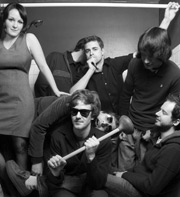In deep thought with The Most Serene Republic
Lennsen was talking about his band's new album, Population, which is, ambitiously enough, a critique of all humanity.
 To begin, however, The Most Serene Republic is an indie rock group that were formed in Milton, Ontario. Disappointed with the typical 905 ‘screamo' trend, they started their journey as a six-piece group playing rock and pop in a different sort of style. Taking influence from bands like Radiohead (whose album, Kid A, they cite as one of their most influential), and more recently bands like Broken Social Scene and The Stars, TMSR have developed into one of the most promising Canadian indie acts, whose talents have landed them gigs such as the Halifax Pop Fest, not to mention North American and European tours. They are also signed to perhaps the most prominent independent record label in Canada, Arts and Crafts, which remains home to artists like Broken Social Scene and Feist.
To begin, however, The Most Serene Republic is an indie rock group that were formed in Milton, Ontario. Disappointed with the typical 905 ‘screamo' trend, they started their journey as a six-piece group playing rock and pop in a different sort of style. Taking influence from bands like Radiohead (whose album, Kid A, they cite as one of their most influential), and more recently bands like Broken Social Scene and The Stars, TMSR have developed into one of the most promising Canadian indie acts, whose talents have landed them gigs such as the Halifax Pop Fest, not to mention North American and European tours. They are also signed to perhaps the most prominent independent record label in Canada, Arts and Crafts, which remains home to artists like Broken Social Scene and Feist.
Now, after a line-up change that left the band with a total of seven members, their third release on Arts and Crafts, Population has been out since early October and is their most exciting work to date. Some may call it over-reaching, but Lennsen, the band's focal songwriter attacks (directly or indirectly) everything from the Internet to nine-to-five jobs.
“We live in a time of speed, and media over-saturation,” Lenssen mentioned about the themes on the album. “So much to the point now where people can't just sit down and watch a movie; people can't read a book... even our social lives are accessible.”
Instead, he believes that a revolution is due - one that will, with any luck, push artistic levels towards new frontiers that have not yet been explored.
The general idea presented through Population is that society has become trapped by itself and the media, forever to bask in the status quo. Whether he was intentionally exaggerating to make a point, or genuine in his belief, I couldn't tell, but The Most Serene Republic's writer certainly seemed to have some grim views of the world we live in.
“We've read all those beautiful dystopian novels about what could be, [but] what is, is much scarier than all those things put together,” Lenssen explained. “And the scariest part of all of it is that we don't realize it.”
Lenssen, in fact, also made some very apt points about how society has been degraded by technology through websites like Facebook. He critiqued the social networking tool, and particularly the fact that those who ‘re-unite' through it, so to speak, usually end up realizing that they lost contact for a reason.
Musically speaking, however, Population has moments that are just as ambitious as Lenssen's philosophies on life and society. Melody lines of trombones and strings flow seamlessly over bass and guitar lines that add subtlety to the musical arrangements. Two-part male and female vocals also work well in the mix, especially when they are used as instruments, rather than centrepieces for the songs. Of particular acclaim, though, is the drumming on Population, which, above all things, manages to stray from stereotypical rock beats, and ultimately propel the songs into new territory.
Live versions of many of these songs can be witnessed at The Salt Lounge on Saturday, November 3, where The Most Serene Republic can be seen playing with Dragonette and Mother Mother.
When I lastly asked Lenssen if he would The Most Serene Republic would be the ones to bring on such a revolution, he responded, “Even if it was my job, I'm not sure if we'd provide the right answers...we just point out the holes in the armour.”













